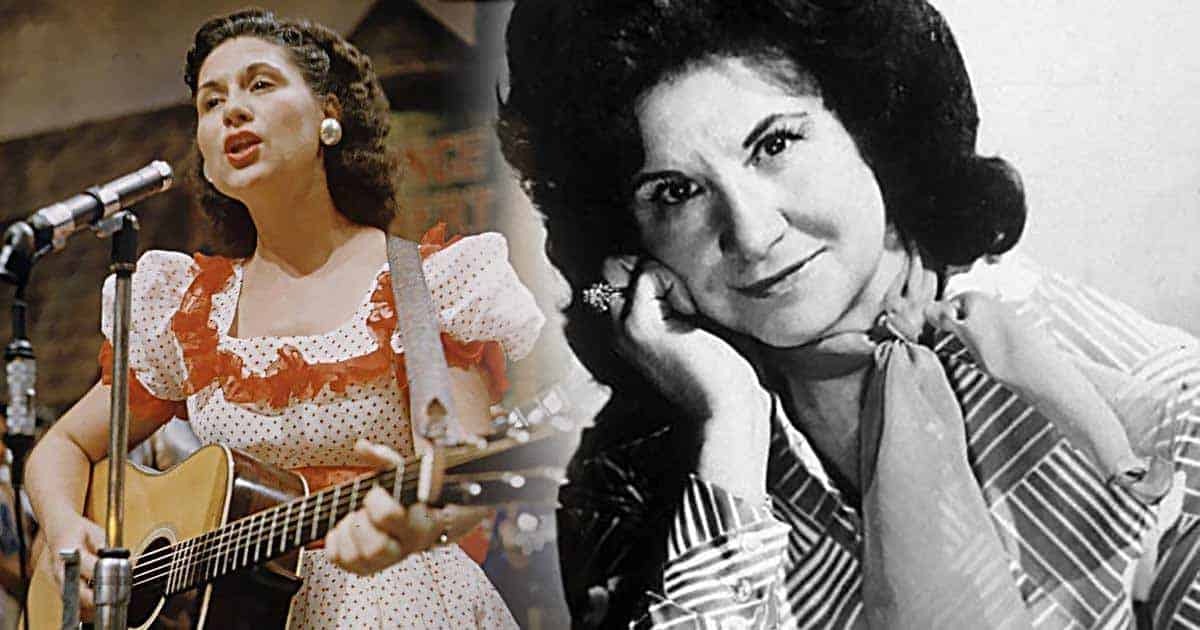Over the decades, country music has seen many iconic figures, but few have had an impact as transformative as Kitty Wells. Often overshadowed by household names like Dolly Parton and Patsy Cline, Wells quietly and powerfully carved her place in history as one of the first female country music superstars.
Her legacy began in earnest in the early 1950s, when she challenged the norms of a male-dominated industry and helped redefine the role of women in country music. Today, music historians and fans continue to celebrate her as a pioneer who opened doors for generations of female artists.

The Early Career of Kitty Wells
Kitty Wells, born Ellen Muriel Deason in 1919, began performing music in her teenage years. She adopted the stage name “Kitty Wells” from a folk song, and in the 1940s, she started recording music and performing with her husband, Johnnie Wright, of the duo Johnnie & Jack.
Although she released a few tracks in the 1940s, it wasn’t until the early 1950s that she would make her mark on the national stage — not just as a talented performer, but as a groundbreaking voice of change in the genre.
Making Country Music History in 1952
In 1952, Kitty Wells recorded a song that would not only launch her into stardom but also shift the landscape of country music: “It Wasn’t God Who Made Honky Tonk Angels.”
At a time when few female voices were heard in mainstream country, Wells’ song delivered a powerful message. The lyrics directly responded to Hank Thompson’s song “The Wild Side of Life,” which blamed women for broken marriages. Wells challenged that narrative, presenting a perspective that had long been ignored in the genre.
The song’s message was considered controversial for the era. In fact, some major radio networks, including NBC, initially banned it. Despite that, public response to the song was overwhelmingly positive. Audiences resonated with the honest, emotionally charged lyrics and the boldness of a woman standing up against unfair stereotypes.
“It Wasn’t God Who Made Honky Tonk Angels” quickly rose to No. 1 on the Billboard country charts, making Kitty Wells the first solo female artist in country music history to achieve that milestone. The song’s success forced the industry to recognize the market and voice of women in country music.

Historic Performance at the Grand Ole Opry
The same year that her groundbreaking single reached No. 1, Kitty Wells became the first female solo artist to perform on the prestigious stage of the Grand Ole Opry. While other women had appeared in duos or groups before, Wells was the first to make such a powerful solo impact.
Her performance of “It Wasn’t God Who Made Honky Tonk Angels” at the Opry was more than just a musical moment — it was a cultural milestone. For the first time, a woman had used the country music platform to challenge dominant social narratives and give voice to women’s experiences in relationships and society.
Her appearance at the Grand Ole Opry marked a turning point, both in the visibility of female artists and in the types of stories country music was willing to tell.
Long-Term Impact and Legacy
Following her historic breakthrough, Kitty Wells continued to build a prolific career. She released numerous albums throughout the 1950s and 1960s, consistently charting hits and building a loyal fanbase.
In addition to “It Wasn’t God Who Made Honky Tonk Angels,” Wells recorded several other successful songs that addressed topics rarely covered by women in country music at the time, including heartbreak, independence, and social judgment. She showed that country music could be both commercially successful and socially reflective.
Her influence paved the way for later generations of female artists, including Loretta Lynn, Tammy Wynette, and Dolly Parton, who have all cited Wells as a foundational figure in their own careers.

Awards and Recognition
Throughout her life, Kitty Wells received many honors for her contributions to music:
-
In 1976, she was elected to the Country Music Hall of Fame, a recognition of her lasting legacy and pioneering spirit.
-
In 1991, she received the Grammy Lifetime Achievement Award, becoming one of the first female country artists to be honored in this way.
-
Wells was also awarded a star on the Hollywood Walk of Fame, commemorating her influence beyond just the music world.
Her achievements set a standard and broke barriers, proving that women not only belonged in country music — they could lead it.
A Continued Influence on Modern Country
Though Kitty Wells passed away in 2012 at the age of 92, her music continues to resonate. Her songs are frequently cited in retrospectives of country music history, and her bold stand in 1952 remains a landmark moment in American music.
Contemporary artists across genres still draw inspiration from her courage and authenticity. Many country singers today, both men and women, continue to write and perform songs that speak openly about complex emotions and societal issues — a path Wells helped forge.

Why Kitty Wells Still Matters
In a world where media often focuses on the newest trends and personalities, the story of Kitty Wells is a reminder of the artists who quietly reshaped their industries. Her career is a testament to the power of music as a form of expression, resistance, and representation.
She may not have sought fame in the way many do today, but her impact on country music is undeniable. Kitty Wells gave voice to perspectives that had long been ignored and did so with grace, talent, and determination.
Whether you’re a long-time fan of classic country or just discovering the genre, taking a moment to explore the music and message of Kitty Wells offers valuable insight into the roots of modern country — and the women who helped build it.
